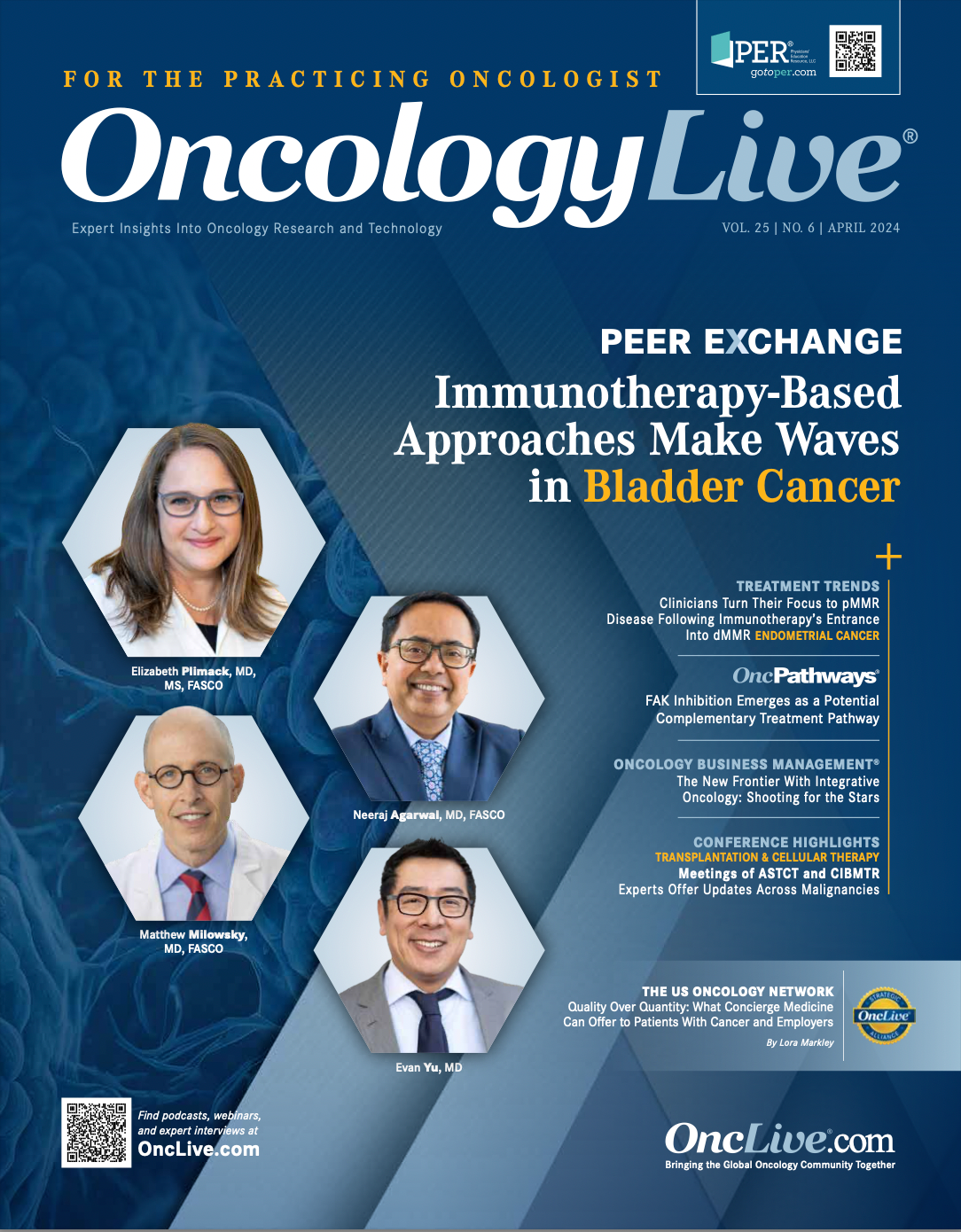FAK Inhibition Emerges as a Potential Complementary Treatment Pathway
Although FAK inhibition alone has displayed modest activity to date, there is interest in developing FAK-targeted therapies for combination regimens.
Bradley J. Monk, MD, FACS, FACOG

FAK is a nonreceptor tyrosine kinase with a critical role in the interaction between the cell and the extracellular matrix, regulating cellular adhesion, motility, proliferation, and survival; overexpression of the kinase is associated with poor prognosis in patients with cancer. Efforts are underway to develop FAK-targeted therapies; although FAK inhibition alone has displayed modest activity to date, the approach has shown promise as a combinatorial agent.1,2
FAK is a part of multiple signaling pathways that contribute to the survival and proliferation of cancer cells, including PI3K/AKT, P53, and RAS/RAF/MEK. Additionally, the FAK pathway has been shown to mediate resistance to anticancer therapies. Targeting the FAK pathway has been shown to have a sensitizing effect on radiotherapy and chemotherapy. Moreover, heightened expression of FAK and the activation of the downstream Wnt/β-catenin signaling pathway can contribute to adaptive or acquired resistance mechanisms to BRAF or MEK inhibitors, which has stirred interest in FAK inhibition in combination therapy.3
Defactinib Shows Promise As a Combination Component in Ovarian Cancer
The FAK-targeted agent that has shown the most promise to date and progressed the furthest in clinical development is the second-generation inhibitor defactinib (VS-6063). In the phase 1/2 FRAME trial (NCT03875820), investigators evaluated the safety and efficacy of defactinib in combination with the RAF/MEK inhibitor avutometinib in patients with advanced solid tumors, including low-grade serous ovarian cancer (LGSOC).4
LGSOC is a RAS/MAPK-driven cancer in more than 70% of patients and currently has an unmet need for effective treatment options with no FDA-approved therapies. In preclinical study, avutometinib plus FAK inhibition displayed clinical synergy and antitumor activity in KRAS-mutated and wild-type LGSOC models. Additionally, FAK inhibition in combination with avutometinib and chemotherapy induced tumor regression and extended survival in a pancreatic cancer mouse model.
"Avutometinib is a RAF/MEK inhibitor that is unique compared with other MEK inhibitors,” Bradley J. Monk, MD, FACS, FACOG, medical director of latephase clinical research at Florida Cancer Specialists & Research Institute in West Palm Beach, said in an interview with OncologyLive. “It is potentially the best-in-class [agent] based on its activity as well as its tolerability. The preclinical antiproliferative activity [with this agent] across multiple MAPK pathway alterations, [including] RAS, BRAF, and MEK, is transformational. Defactinib is a FAK inhibitor, and the idea is that together they could be synergistic.”
"A classic escape mechanism [of RAF/MEK] inhibition is through the FAK pathway,” David M. O’Malley, MD, a professor in the Department of Obstetrics and Gynecology at The Ohio State University College of Medicine and director of the Division of Gynecologic Oncology at The Ohio State University Comprehensive Cancer Center– James in Columbus, added in an OncLive News Network Program. “Defactinib is an inhibitor to that escape pathway. So, we have dual inhibition at the RAF/MEK pathway and inhibition at the escape or resistance pathway with the FAK inhibitor. These mechanisms of action in this triple blockade have been shown to be efficacious.”
Avutometinib plus defactinib received a breakthrough therapy designation from the FDA in May 2021 for the treatment of patients with recurrent LGSOC, regardless of KRAS status, following at least 1 prior line of treatment including platinum-based chemotherapy.5
At a data cutoff of July 2023, findings from FRAME presented during the 5th Annual RAS-Targeted Drug Development Summit, which took place in September 2023 in Boston, Massachusetts, demonstrated that patients with LGSOC who received the combination of avutometinib and defactinib (n = 26) achieved an overall response rate (ORR) of 42%. Additionally, the median duration of response (DOR) and the median progression-free survival (PFS) were 26.9 months (95% CI, 8.5-47.3) and 20.0 months (95% CI, 11.1-31.2), respectively. Patients were heavily pretreated, with a median of 3.5 prior lines of therapy.4
During the 2023 American Society of Clinical Oncology Annual Meeting, which took place in Chicago, Illinois, in June, study authors presented initial efficacy and safety findings from the phase 2 ENGOT-ov60/GOG-3052/RAMP 201 trial (NCT04625270). RAMP 201 enrolled patients with recurrent LGSOC who underwent prior chemotherapy; previous treatment with a MEK inhibitor was permitted. The study evaluated the combination of avutometinib plus defactinib as well as avutometinib monotherapy; the primary end point was ORR by blinded independent central review.6
At the April 6, 2023, data cutoff, findings from an interim analysis of RAMP 201 demonstrated that patients who received the combination (n = 29) achieved a confirmed ORR of 45% (95% CI, 26%-64%), with 86% of patients experiencing tumor shrinkage. The median time to response was 5.5 months (range, 1.6-14.7), and the median DOR and PFS had not been reached. Comparatively, the ORR in the monotherapy arm (n = 30) was only 10% (95% CI, 2%-24%), underscoring the impact of the addition of FAK inhibition to RAF/MEK inhibition. Additionally, responses with the combination were observed in patients with KRAS-mutated (n = 15) as well as KRAS wild-type disease (n = 14), with respective ORRs of 60% and 29%.
"[This is] great news for patients that now we have a combination that is tolerable and has an ORR of 45%,” Monk explained. “What does that 45% ORR mean? The Gynecologic Oncology Group [led the phase 2/3] Study 281 [NCT02101788] with another MEK inhibitor, trametinib [Mekinist], and [the ORR] was 26% vs 6% with chemotherapy. Then, I reported [data from] the [phase 3] MILO trial [NCT01849874] with another MEK inhibitor, binimetinib [Mektovi], which elicited an ORR of 16% vs 13% with standard-of-care chemotherapy.”
In March 2024, investigators presented findings from a subgroup analysis of RAMP 201 during the Society of Gynecologic Oncology Annual Meeting on Women’s Cancer (SGO 2024). Findings from the analysis showed that the response with avutometinib plus defactinib was consistent regardless of the number of prior lines of therapy a patient received; patients who received 1 to 3 prior lines (n = 11) and those who received 4 or more (n = 18) achieved ORRs of 45.5% (95% CI, 17%-77%) and 44.4% (95% CI, 22%-69%), respectively. Moreover, among patients with efficacy data available for their last line of treatment (n = 23), the combination elicited an ORR of 43.5% compared with 8.7% with the last prior line of therapy.7
In December 2023, Verastem Oncology announced that it had initiated the confirmatory phase 3 RAMP 301 trial (NCT06072781), which will compare avutometinib plus defactinib with investigator’s choice of chemotherapy in patients with LGSOC. In the news release, the company also noted that it intends to submit a new drug application to the FDA seeking the accelerated approval of avutometinib plus defactinib in LGSOC supported by findings from RAMP 201 and FRAME.8
“LGSOC has a unique molecular, histologic, and clinical profile that differs dramatically from the most common type of ovarian cancer. Response rates to standard of care treatments are disappointing, and there are still no FDA-approved treatments specifically for LGSOC,” Rachel N. Grisham, MD, section head of ovarian cancer and director of gynecologic medical oncology at Memorial Sloan Kettering Cancer Center in Westchester, New York, as well as the global lead investigator of RAMP 301, said in the news release. “The combination of avutometinib and defactinib continues to show promise in recurrent LGSOC, and I am looking forward to leading this confirmatory trial with the goal of establishing a new standard of care for people with this rare form of ovarian cancer.”8
During SGO 2024, investigators presented the trial schema of RAMP 301. The open-label study is enrolling approximately 270 patients with recurrent LGSOC who have progressed on or after platinum-based therapy across North America, Europe, and Asia Pacific. Patients will be randomly assigned 1:1 to receive either avutometinib 3.2 mg twice weekly for 21 of 28 days plus defactinib 200 mg twice daily for 21 of 28 days or investigator’s choice of chemotherapy. The primary end point is PFS per RECIST 1.1 by blinded independent central review; secondary end points include investigator- assessed PFS, OS, ORR, DOR, disease control rate, and safety.9
“If we can get this [combination] FDA approved, this will change the standard of care,” Monk said. “This will be the standard of care in patients [with LGSOC who underwent] prior therapy. [This combination generated] tumor shrinkage in most patients and an ORR, at least preliminarily, of 45%. Once we get accelerated approval [from the FDA], we’ll probably have to stop the confirmatory trial enrollment here, but that will take time. For now, look for the confirmatory trial [and] let’s get it enrolled so we can get this [regimen] approved.”
Clinical Study of Additional FAK Inhibitors in Underway in Other Cancer Types
Beyond LGSOC, early-phase clinical trials of FAK inhibitor monotherapy and combination regimens are underway in a variety of other cancers, including lung cancer, pancreatic cancer, hematologic malignancies, and advanced solid tumors. Another agent that has shown promise in multiple cancer types is the selective, ATP-competitive FAK inhibitor ifebemtinib (IN10018).3
In a phase 1 study (NCT01335269) of patients with advanced or metastatic nonhematologic malignancies, ifebemtinib monotherapy displayed a manageable safety profile with preliminary activity at a maximum tolerated dose (MTD) of 200 mg once daily. During the dose escalation phase, among efficacy-evaluable patients (n = 49), 27% achieved a best response of stable disease and 51% of patients experienced progressive disease. The median duration of disease control was 99 days (95% CI, 87-141) and included 4 patients who had stable disease for at least 150 days. Notably, the population was heavily pretreated and included patients with metastatic pancreatic adenocarcinoma, platinum-resistant ovarian cancer, metastatic esophageal cancer, and metastatic soft tissue sarcoma.10
Similarly, in a Japanese phase 1 study (NCT01905111) of patients with advanced or metastatic solid tumors, ifebemtinib monotherapy demonstrated a manageable safety profile with potential antitumor activity. No dose-limiting toxicities were reported, and the MTD was also 200 mg once daily. In a heavily pretreated population (n = 21) in which 67% of patients received at least 3 prior chemotherapy regimens, 1 patient experienced an objective response and 5 achieved stable disease.11




